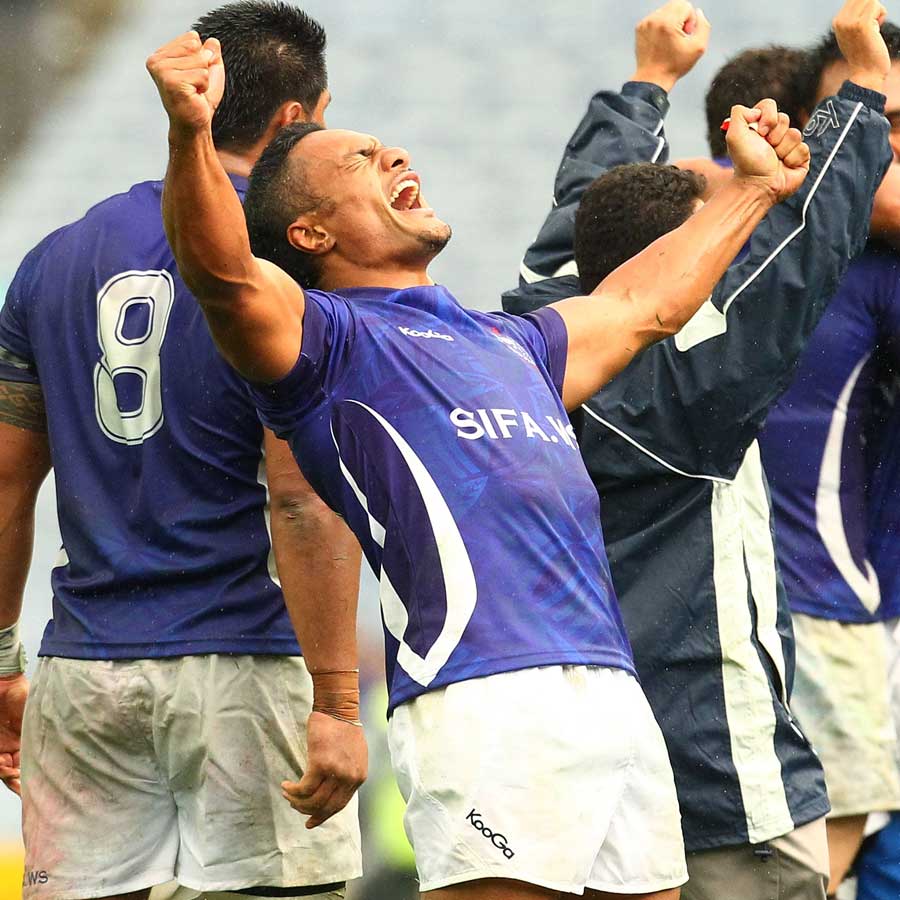|
Comment
Conspiracy theories wide of mark
John Taylor
September 21, 2011

Eliota Fuimaono-Sapolu launched a scathing attack on the IRB over the RWC fixture list
© Getty Images
Enlarge
Eliota Sapolu's rant on twitter was way over the top and he is lucky he is not in trouble with the International Rugby Board but it did yet again highlight the real grievance felt by the smaller nations at every Rugby World Cup. Sapolu's expletive laden tweets left nobody in any doubt he felt the organisers had loaded the dice against Samoa for their match against Wales - and there can be no doubt that the smaller nations get a raw deal when it comes to scheduling - but his inference, that they are doing it to minimise upsets and preserve the status quo, is rubbish. First, let us look at the real facts surrounding that match. Yes, Samoa had a four day turnaround whilst Wales had seven days but they had played very different opposition. Wales had had a brutal battle against South Africa, the top seeds in the pool, and had given everything before coming up just short of pulling off a famous victory. By comparison Samoa had had a gentle pipe opener against the weakest side in the pool and perhaps the tournament. True, they did not come through unscathed but injuries in rugby are a fact of life. They could have fielded a side full of back-up players if they had so wished and would still have won comfortably but chose to give their strongest starting XV and outing - running out 49-12 winners. Without the injuries I would argue it was the ideal preparation for the Welsh game. I also have no doubts Wales would have preferred to meet the Springboks later in the tournament but the schedule demanded a big game on that first weekend and Pool D was the unlucky group selected to provide it. Because rugby is so physical the gaps between matches will always be a big issue that has to be factored in when the playing calendar is being worked out but there are a host of other factors too and, ultimately, as always in professional sport money is one of the most important. Television rights are arguably the biggest contributor to IRB revenues from World Cups and the deal with UK broadcaster ITV for this tournament was not announced until July 2010 - very late in the day for such a major contract. To many people's surprise it was also announced that this would be another two-tournament deal so that ITV are guaranteed coverage of the 2015 tournament when England are the host nation. Having been involved on the periphery of the negotiations of the previous deal for 2003 and 2007 I was not at all surprised. ITV pulled out of those negotiations at one stage in 2000 because we were worried about losing money in Australia; at that stage nobody realised that England would end up favourites and eventual winners. It was only when we were able to restructure to guarantee rights for the 2007 RWC in France - critically in the same time zone which guaranteed big audiences and commercial success - that the IRB/RWC were able to command the money they wanted (and needed for the development funding for the next four years). Even then we spent a huge amount of time discussing the tournament schedule. It was still essential that Home Unions matches and other major games would be staged at weekends with evening kick-offs so that they would not be happening in the middle of the night back in the UK. Knowing how important this was the Australian Rugby Union organising committee was wonderfully cooperative and even agreed to put England in the pool that played its early games in Perth where the time difference was only seven hours instead of nine. Kick-offs at midday or later on weekends - perfect! Imagine how much more important that scheduling is here in New Zealand where the time difference started out as 11 hours and moves to 12 this weekend. New Zealand is still a country where most people go to bed early even at weekends so it has come as a shock to many of the locals to discover the final will not kick-off until 9.00pm. So, forget the conspiracy theories - this is all about money. The IRB like the idea of the smaller nations competing - hence the increase to 20 nations from 16 - because the World Cup provides a great platform for promoting rugby as a global game - but the penalty is they have to put up with a playing schedule where giving them a level playing field is not the priority. It is partly a confidence thing and will only change when the IRB manages to persuade television that the World Cup is indeed the third biggest sporting event in the world behind the football World Cup and the Olympics so that fans will find a way of watching whenever games are played. Only then will they be able to schedule fairly. © ESPN Sports Media Ltd. John Taylor is a former Wales and British & Irish Lions international and currently the managing director of London Welsh
|
Live Sports
Communication error please reload the page.
-
Football
-
Cricket
-
Rugby
-
- Days
- Hrs
- Mins
- Secs
F1 - Abu Dhabi GP
Abu Dhabi Grand Prix December 11-131. Max Verstappen ()
2. Valtteri Bottas (Mercedes)
3. Lewis Hamilton (Mercedes)
4. Alexander Albon ()
5. Lando Norris ()
6. Carlos Sainz Jr ()
-
ESPNOtherLive >>
Golf - Houston Open
Snooker - China Open
Tennis - Miami Open

